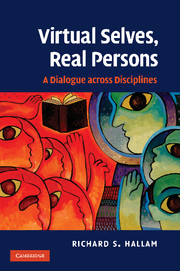Book contents
- Frontmatter
- Contents
- Acknowledgements
- Part I A constructionist framework for person and self
- 1 The main themes: virtual selves, mind–body dualism and natural science
- 2 Conceptualising self
- 3 Generic persons and selves
- 4 Multiplicity within singularity
- 5 Sense-of-self: the first-person perspective
- 6 Self in historical explanation
- 7 Self as historically positioned and narrated
- Part II Person and self in science
- Bibliography
- Index
3 - Generic persons and selves
Published online by Cambridge University Press: 04 August 2010
- Frontmatter
- Contents
- Acknowledgements
- Part I A constructionist framework for person and self
- 1 The main themes: virtual selves, mind–body dualism and natural science
- 2 Conceptualising self
- 3 Generic persons and selves
- 4 Multiplicity within singularity
- 5 Sense-of-self: the first-person perspective
- 6 Self in historical explanation
- 7 Self as historically positioned and narrated
- Part II Person and self in science
- Bibliography
- Index
Summary
As already explained in Chapter 2, I regard generic concepts of Person and Self (capitalised) as theoretical abstractions in a framework for interpreting local concepts of person and self across time and culture. They are not constructs in a psychological theory that explain how an individual functions. They are more like foundation conditions for a theory within social science that can be applied cross-culturally. This is a challenging task but if it were not possible to develop a framework of this kind, we would be condemned to viewing every concept of person and self in relative terms. This would make it impossible to identify, appraise and compare persons and selves historically or cross-culturally.
Theorists take different attitudes to the inevitable cultural relativity of their own theories. Psychologists usually proceed as if their constructs have universal application. Cultural psychologists focus on cultural differences but they may still assume that these represent variations of universal processes. Anthropologists, working at a meeting place of cultures, cannot avoid being aware that constructs are relative. They distance themselves from the universalist bias of psychology, and those who adopt a universal framework are in a minority (e.g., Spiro 1993). Constructionists, almost by definition, are little concerned with constructs that overarch different social or cultural locations. From their perspective, concepts such as mind, mental state or behavioural response are already problematic because they prejudge the terms in which arguments about persons and selves are couched.
- Type
- Chapter
- Information
- Virtual Selves, Real PersonsA Dialogue across Disciplines, pp. 55 - 77Publisher: Cambridge University PressPrint publication year: 2009



